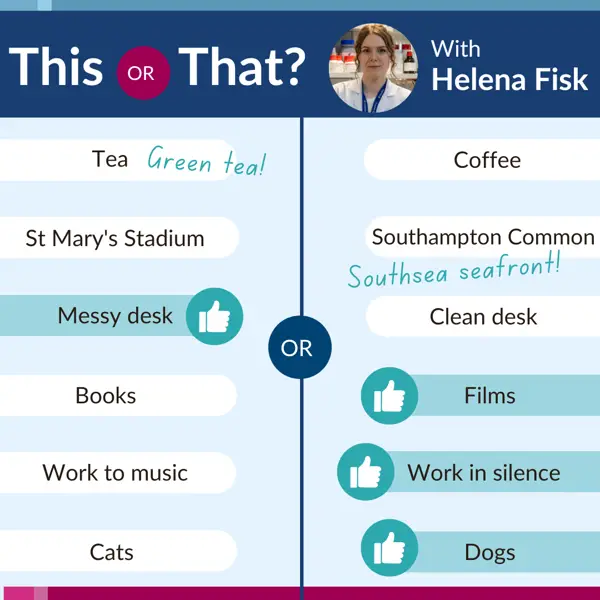Promoting healthy ageing: Meet Helena Fisk
Southampton researchers are looking at new ways to improve health through nutrition.
Obesity is a major public health problem in England. It costs the NHS around £6.5 billion a year.
Researchers in our NIHR Southampton Biomedical Research Centre (BRC) are helping people change their habits so they can live healthier for longer.
They include Dr Helena Fisk. She explains her route into research and what she hopes to achieve through a one-year BRC Postdoctoral Bridging Fellowship.
How did you become interested in research?
I was always fascinated by the human body: how our body functions and how things can go wrong and why. This led me to pursue a degree in biomedical science. During my degree, I became interested in the role of nutrition in biochemistry and physiology.
It was through an undergraduate research project that I discovered enjoyment in research and began to consider it as a potential career pathway.
I then joined Prof Philip Calder’s group as a research technician. This experience solidified my interest in pursuing a research career, specifically in the field of nutrition. It led me to pursue a part-time PhD in nutritional medicine alongside my role as a technician.
My research focuses on inflammation in obesity and ageing. I am investigating the effects of nutrients including omega-3, probiotics, and vitamin D on the immune system, inflammation, and disease.
What is the healthcare challenge that you are seeking to address?
I am seeking to address inflammation that occurs with obesity and ageing. This inflammation increases the risk of developing diseases such as heart disease and diabetes. It also increases susceptibility to infections and their severity.
Rates of overweight and obesity in the UK are rising. 64% of the adult population are now living with overweight and obesity.
We also have an increasing population of older adults who live with age related inflammation. They too are at increased risk of developing associated diseases.
I aim to understand how this inflammation occurs and find ways of reducing this to decrease the risk of related diseases and improve quality of life. I am interested in how we may be able to target inflammation and support health with nutrition.
A key focus of mine is how we may be able to target inflammation and the immune system using dietary lipids.

What do you hope to achieve in your research at the BRC?
During this fellowship I will research the effects of Vitamin D and a probiotic on inflammation and gut health in older adults. I also aim to extend this research to understand how lipids are metabolised (broken down and used) to control inflammation in this group of people. This will shed new light on the role of gut bacteria in controlling inflammation through lipids.
My goal is to become an independent researcher and establish myself as an emerging leader in the field of lipid signalling and metabolic inflammation.
This fellowship will support me with progressing towards these goals. It will provide me with time to generate key data and undertake opportunities that support further career development and fellowship application.
How would you sum up your fellowship in three words?
Opportunity, development, encouraging
What's it like being an early career researcher in Southampton?
Being an early career researcher at the University of Southampton has provided me with excellent opportunities to develop my research skills and expertise.
I have benefitted from access to state-of-the-art facilities, and been able to network, collaborate, and disseminate my work to establish myself within my research field and the university faculty.
It has been fantastic to develop my independence in such a supportive environment.
What advice would you give other early career researchers?
The transition from PhD student to early career researcher seeking independence is a big step. It comes with lots of challenges but it also presents excellent opportunities to gain new skills and further your personal development.
It is important to be proactive and seek out opportunities. Don't be afraid to ask for support with your endeavours and I would advise seeking mentorship.
Rejection is tough but common when applying for funding and fellowship schemes. Being reflective but keeping positive and determined is key.
Put yourself out there: network, disseminate your research and make sure to celebrate your achievements.